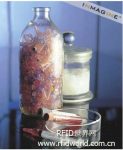
RFID chip makes discarded syringes safer
[ad_1]
This year, a group of MBA students from the University of Victoria in Canada demonstrated the NeedleSight project at the school’s information technology exhibition and won the popular vote award. The project embeds RFID chips in syringes to make it easier for city cleaners to find discarded needles and ensure the safety of pedestrians.
The price of the chip attached to the 20-cent syringe is only 5 cents, similar to the barcodes commonly used in stores. Cleaning staff or park staff can carry an RFID reader with them, and it will beep when the reader is within 1 meter of the needle, a member of the NeedleSight project said.
The NeedleSight project team hopes that this idea can be adopted by needle delivery agencies.
“We noticed that a large number of used needles were discarded on public roads in Victoria,” said Ahmed, a project member.
“This is a big problem. If you have young children, you definitely don’t want them to be stabbed by discarded needles. Similarly, other people playing in the park or playing on the baseball field are also at risk in this regard.”
“With people accidentally getting needle sticks, receiving treatment, and huge concerns about potential infections, the cost of RFID chips is quite low,” Ahmed said.

RFID chip makes discarded syringes safer
The next step of this project is the feasibility study and commercial application plan, which will be passed on to relevant decision-makers, he said.
“The production part of the RFID needle tube is easy to implement, but its application requires strong government support.”
David Speed, the assistant director of Victoria City Parks, said that about four people were needled last year. Although no one was infected, this is indeed a worrying issue.
As long as the size of the reader is small enough to fit into the gloves of employees, RFID tags can play an important role.
However, RFID syringes can cause privacy concerns for needle users, says Andrea Langlois of AIDS Vancouver Island.
When people get needles, confidentiality of information is an important factor they consider, she said.
“Users may worry about being tracked, and are unwilling to take our needles. I will worry about this problem,” she said.
Dr. Jane Buxton, a hazard reduction control expert at the BC Center for Disease Control, said, “The center distributes millions of syringes every year. Considering this huge number and potential hazards, we should pay more attention to the 100% safe handling of syringes instead of RFID chips. .”
[ad_2]



